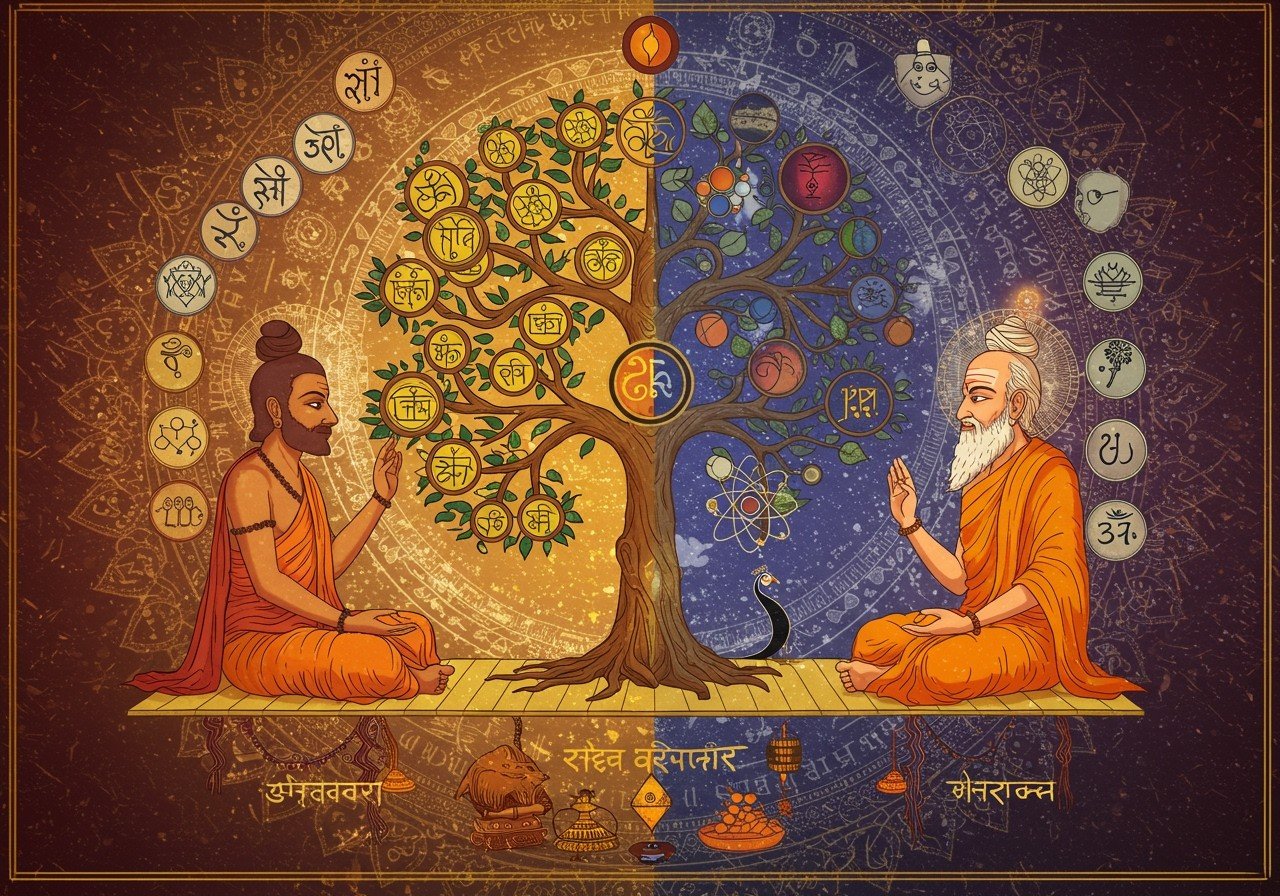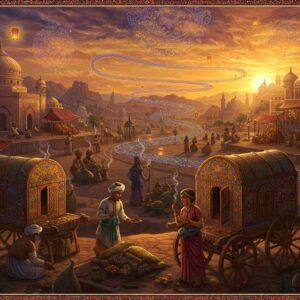
In the vast tapestry of Indian philosophy, the Nyaya and Vaisheshika schools hold a special place. These interconnected systems offer unique perspectives on logic, knowledge, and the nature of reality. For those seeking traditional wisdom in our modern world, understanding these philosophies offers valuable insights, connecting us to our cultural roots and the depth of classical Indian thought.
Historical Context and Origins
The Nyaya and Vaisheshika schools boast rich historical backgrounds. The Nyaya school, founded by the sage Gautama, centers on logic and knowledge, providing tools for critical thinking and reasoned debate. Its foundational text, the Nyaya Sutras, likely originated between the 6th and 2nd centuries BCE. The Vaisheshika school, attributed to Kanada, delves into metaphysics and the categories of reality, as outlined in the Vaisheshika Sutras, also dating back to ancient times. These schools gained prominence between the 2nd and 5th centuries CE and have profoundly shaped Indian philosophical discourse for centuries.
Explore the historical context further with our collection of sacred texts and scriptures available on Poojn.in. Deepen your understanding of these ancient philosophical systems with authentic copies of foundational texts.
Philosophical Foundations
Nyaya, rooted in Gautama’s teachings, provides the Nyaya Sutras, emphasizing knowledge acquisition through perception, inference, comparison, and testimony. These methods empower critical thinking and informed debate, offering a structured approach to understanding the world. Vaisheshika, with Kanada’s Vaisheshika Sutras, categorizes reality into substances, qualities, and actions, creating a framework for understanding the universe’s fundamental components. These texts illuminate ancient Indian thought, enriching our understanding of this valuable cultural heritage.
Enhance your study with Poojn.in’s range of traditional Puja items. Discover authentic Vaijanti malas and other ritual materials that align with the systematic approach of these philosophies.
Comparison of Philosophical Tenets
Nyaya and Vaisheshika, often described as sister schools, offer complementary perspectives. Nyaya focuses on how we know, exploring the process of knowledge acquisition (epistemology), while Vaisheshika investigates what exists, examining the nature of reality (ontology). Nyaya’s logical framework supports Vaisheshika’s metaphysical claims, creating a synergistic relationship between the two. Both schools converge on key beliefs: true knowledge as the path to liberation (moksha), the Vedas as authoritative scriptures, and ignorance as the root of suffering.
Epistemological Insights (Nyaya’s Focus)
Nyaya’s epistemology is systematic and comprehensive. It outlines four pramanas, or valid means of knowledge: perception, inference, comparison (analogy), and testimony (verbal or scriptural authority). These pramanas provide a framework for discerning truth from falsehood, equipping individuals with the tools for critical evaluation. Vaisheshika, while primarily relying on perception and inference, acknowledges the other pramanas, creating a robust and nuanced understanding of knowledge.
Metaphysical Frameworks (Vaisheshika’s Focus)
Vaisheshika’s metaphysics introduces the concept of padarthas, categories of reality, providing a structured classification of existence. The seven padarthas—substance, quality, action, generality, particularity, inherence, and non-existence (abhava)—help us comprehend both the physical and abstract dimensions of the universe. Nyaya’s logical analysis supports and complements this framework, offering a reasoned basis for understanding the nature of reality. Enhance your understanding of Vaisheshika’s emphasis on material elements with Poojn.in’s collection of pure copper and brass items, considered sacred in Vedic traditions.
Influence and Legacy
The influence of Nyaya and Vaisheshika resonates throughout Indian philosophical history, impacting schools like Vedanta and even Buddhism. Their emphasis on logic, epistemology, and systematic thinking continues to inform modern philosophical discussions, promoting critical analysis and rational debate—essential skills for navigating the complexities of contemporary life. Embrace these teachings to connect with our rich cultural heritage and gain valuable tools for navigating the present.
Key Differences and the Eventual Merger
While closely related, Nyaya and Vaisheshika hold distinct viewpoints. Nyaya delves deeper into epistemology (the study of knowledge), defining four sources of knowledge (pramanas), while Vaisheshika primarily recognizes two. Vaisheshika’s ontology (study of being) uses seven categories of reality (padarthas), whereas Nyaya expands this to sixteen. Despite their individual focuses, these schools converged and formally merged around the 10th century AD, becoming the combined school of Nyaya-Vaisheshika.
FAQs on Nyaya and Vaisheshika
What are the core tenets of Nyaya and Vaisheshika? Nyaya focuses on logic and epistemology, while Vaisheshika explores metaphysics and the categories of reality.
How do these schools complement each other? Nyaya provides the tools for logical analysis, supporting Vaisheshika’s claims about the nature of reality. Together they offer a comprehensive view.
What is the significance of pramanas in Nyaya? Pramanas are the valid means of knowledge (perception, inference, comparison, and testimony), providing a framework for acquiring reliable knowledge.
What are padarthas in Vaisheshika? Padarthas are the categories of reality, offering a classification system for understanding the universe’s constituents.
What is the ultimate goal of both schools? Both Nyaya and Vaisheshika aim for liberation (moksha) through the attainment of true knowledge.
Deepen your meditation practice with our selection of meditation supplies at Poojn.in. Find mats, asanas, and accessories to support your contemplation of Nyaya’s logical principles and Vaisheshika’s atomic theory.
Conclusion
Nyaya and Vaisheshika are essential threads in the rich tapestry of Indian philosophy. They highlight the significance of seeking knowledge, understanding the world around us, and applying logical reasoning to life’s questions. Nyaya equips us with critical thinking skills, while Vaisheshika offers a framework for comprehending existence. Embracing these teachings connects us to our cultural heritage and empowers us with wisdom for navigating contemporary challenges.


